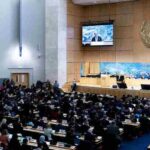
Unless the script changes, the judge who has brought the most headaches to the independence movement in recent months will continue to lead one of the cases that could complicate the amnesty law. Judge Manuel García Castellón faces the decisive phase of the investigation of the Democratic Tsunami case, armored by several decisions of the National Court and the Supreme Court.
The National Court has rejected all attempts by the defenses, some supported by the Prosecutor’s Office, so that the magistrate would be left without the Tsunami case. The endorsement of the majority of the decisions taken by the instructor has been a boost to the controversial reactivation, coinciding with the negotiation of the amnesty, of a terrorism case that has been stranded for years.
Among the defenses of the case, the fact that the Criminal Chamber, in charge of reviewing García Castellón’s decisions, did not evaluate the merits of the petition to remove the judge for his statements against the amnesty in a conference was especially surprising. from the newspaper La Región in Ourense, presented by far-right businessman Julio Ariza.
The Chamber rejected the request for recusal made by the leader of Òmnium Cultural Oleguer Serra based on an “insurmountable formal defect”: the lack of a special power of recusal of the magistrate that indicated the procedure number and the cause of recusal.
It so happens that this formalism that the Criminal Chamber adopted to avoid assessing the merits of the request to remove García Castellón was not an obstacle in other cases followed in the special court to completely prevent the study of a recusal.
The precedent is in one of the pieces of the Gürtel case, of PP corruption. The former Valencian president Francisco Camps requested to remove in 2021 one of the judges of the court in charge of trying him, José Ricardo de Prada. But, like the person investigated by Tsunami, he did not provide in his request the special power necessary to challenge the magistrate. The error was warned to Camps by the court’s Justice Administration lawyer, who gave him five days to “proceed to correct” the error and hand over power. The former Valencian president did so, and the request for recusal continued its course.
In the end, the National Court ended up rejecting the judge’s challenge raised by Camps, finding that it was unfounded and based on press clippings. But he did study the substance of Camps’ request, although he later rejected it. This has not happened in Tsunami. Appreciating a formal error as sufficient not to go into the merits, nor to order its correction, the Court did not begin to assess whether García Castellón’s words against the amnesty prevented him from continuing to lead Tsunami.
In the Tsunami case, Serra’s defense, carried out by criminal lawyer Benet Salellas, plans to go to the Constitutional Court to argue that the National Court violated his rights by refusing to study García Castellón’s challenge due to a formality and not offering him the possibility of correcting it. .
The support of the Supreme Court and terrorism
The other leg of the National Court’s endorsement of the investigation has come from the Supreme Court. After weeks of disputes between prosecutors, last February the High Court decided to accept the reasoned statement that García Castellón had sent in November and left the Tsunami case regarding the former president and MEP Carles Puigdemont and the ERC parliamentarian Rubén Wagensberg.
During the entire time that the Supreme Court was deciding whether to keep all or part of the Tsunami case – the High Court agreed that the rest of the ten investigated, including the general secretary of ERC, Marta Rovira, remained under investigation by García Castellón – the Chamber The Criminal Court of the National Court did not resolve the key appeal in the case. It was about the challenge of the crime of terrorism carried out both by the Prosecutor’s Office – which did not support the judge’s challenge – and by the defenses in the case.
On March 18, the 3rd section of the Criminal Chamber rejected the prosecutor’s appeal, since the Supreme Court had already ruled that the Tsunami protests could be investigated for terrorism. “The Supreme Court has ruled on the nature and legal classification of these facts,” he limited himself to collecting the order, and then reproducing in full some of the arguments of the High Court.
Some defenses of the case see a “maneuver” by the judge: before waiting for the Criminal Chamber of the National Court to resolve the Prosecutor’s appeal against the accusation of terrorism, García Castellón elevated the case to the Supreme Court, a court that marks criterion for the rest of the judges. In short, the Supreme Court’s approach endorsing terrorism left no room for maneuver for resources.
However, it is worth highlighting that the Chamber’s endorsement of García Castellón has not been limited to the crime of terrorism or to refusing to remove him, but has extended to almost all the decisions that the judge has made since he reactivated the Tsunami case in November. . Whether it is investigating a protest against the king or requests for reports from various authorities and institutions that, paradoxically, have disproved the terrorist hypothesis outlined by the instructor.
The only correction of the Chamber – to whom the pulse has not trembled in other cases to reverse García Castellón’s decisions or urge him to say why he kept the Tsunami case secret for three years – to the instructor has occurred in relation to the setback he dealt Switzerland to locate Rovira. The judge decided to investigate himself the alleged leak of the Swiss response to the press, but the Court forced him to refer the investigations to the investigative courts of Madrid.
The possible error in the instruction period, pending
The only hope that the defenses in the case have in being able to remove García Castellón is a number: 324. It is the article of the Criminal Procedure Law that regulates the investigation deadlines and that, according to the independentistas, García Castellón violated, which, In his opinion, he refers the case to the archive.
Those investigated informed the Supreme Court of this error by the judge before the High Court took part of the Tsunami case. It was a failed attempt to stop the indictment of Puigdemont and Wagensberg. The defenses alleged that García Castellón agreed one day later than required by law to the extension to investigate the case in 2021, which should lead to the case being annulled from that date. But the Supreme Court has not responded to the defenses’ request. The appeals on this issue in the National Court are also pending resolution, as well as those related to the investigation of the Russian plot decided by the instructor.
All of this when the case, once most of the reports that the judge required in November have been collected, now enters its decisive phase: the moment of summoning witnesses and investigators, in parallel with the approval of the amnesty law at the end of May. , which the instructor must apply within a period of two months. Unless the 324 petition is successful, García Castellón will only leave the Tsunami case due to retirement: the judge is obliged, due to age, to retire from the judicial career next October.
Source: www.eldiario.es

